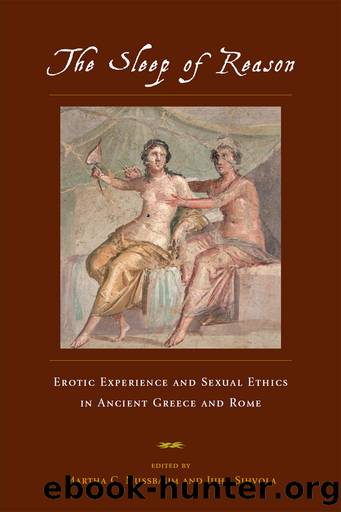The Sleep of Reason by Unknown

Author:Unknown
Language: eng
Format: epub
Publisher: University of Chicago Press
Chapter Eleven
THE INCOMPLETE FEMINISM OF MUSONIUS RUFUS, PLATONIST, STOIC, AND ROMAN
Martha C. Nussbaum
I
One of the most remarkable figures in Roman Stoicism, the Roman eques Musonius Rufus has suffered from an odd combination of neglect and unsubstantiated praise.1 Philosophical scholars have more or less totally neglected this Roman Stoic philosopher (c. C.E. 30â100), who taught Epictetus, who was exiled by Nero to the island of Gyaros for his alleged participation in the conspiracy of Piso, and who is known to posterity from a group of short works, apparently public speeches, on ethical and practical topics (including the need for rulers to learn philosophy!).2 In late antiquity, Musonius was regarded as a major figure, both as teacher and as moral exemplar. Origen, for example, names Musonius and Socrates as the two exemplars of the highest type of life in the pagan world; the pairing was apparently widespread.3 But our philosophical contemporaries have little time for the âRoman Socrates.â The comprehensive collection of texts by A. A. Long and David Sedley, The Hellenistic Philosophers, includes neither any text from Musonius nor any mention of him, even in the section dealing with Stoic views on the political equality of women.4 The burgeoning recent scholarly literature on Hellenistic ethics has not yet, to my knowledge, devoted any extensive attention to the analysis of his arguments. Although his works were well translated by Cora Lutz in a 1947 article in Yale Classical Studies,5 no anthology available to students includes selections from his work. And Lutzâs own introductory essay, though valuable, focuses on historical matters and does not present any detailed analysis of Musoniusâs arguments.
On the other hand, Musonius has some avid fans who have praised him warmly for his views on women, but they have done little to indicate what in the text merits such praise. Most striking of these is the distinguished Marxist historian, the late G. E. M. de Ste. Croix, who included a treatment of the subordination of women in his remarkable magnum opus, The Class Struggle in the Ancient Greek World.6 De Ste. Croix argues that women are an oppressed class in the technical Marxian sense, and that a work on class struggle in the ancient world ought therefore to include some discussion of efforts to free women from this class oppression. Musonius, he argues, was the ancient writer who made the most valuable proposals for womenâs equal treatment, proposals that were unfortunately eclipsed by the more repressive views of his Christian successors, who in general taught the subordination of women to men.7 If only the world had listened to Musonius rather than to Saint Paul, our world would have been a lot happier, and more just. This claim had, and has, a certain plausibility, despite the rhetorical excess with which it was expressed.8 But it does not take us far as analysis. De Ste. Croix made no effort to trace Musoniusâs debt to earlier Stoicism (about which he showed little curiosity), to Plato (a philosopher whom he despised), or to Roman culture generally.
Download
This site does not store any files on its server. We only index and link to content provided by other sites. Please contact the content providers to delete copyright contents if any and email us, we'll remove relevant links or contents immediately.
Twisted Games: A Forbidden Royal Bodyguard Romance by Ana Huang(4028)
Den of Vipers by K.A Knight(2701)
The Push by Ashley Audrain(2698)
Win by Harlan Coben(2665)
Echo by Seven Rue(2246)
Baby Bird by Seven Rue(2213)
Beautiful World, Where Are You: A Novel by Sally Rooney(2180)
A Little Life: A Novel by Hanya Yanagihara(2151)
Iron Widow by Xiran Jay Zhao(2125)
Leave the World Behind by Rumaan Alam(2099)
Midnight Mass by Sierra Simone(2014)
Bridgertons 2.5: The Viscount Who Loved Me [Epilogue] by Julia Quinn(1794)
Undercover Threat by Sharon Dunn(1791)
The Four Winds by Hannah Kristin(1773)
Sister Fidelma 07 - The Monk Who Vanished by Peter Tremayne(1668)
The Warrior's Princess Prize by Carol Townend(1631)
Snowflakes by Ruth Ware(1600)
Dark Deception by Rina Kent(1570)
Facing the Mountain by Daniel James Brown(1553)
